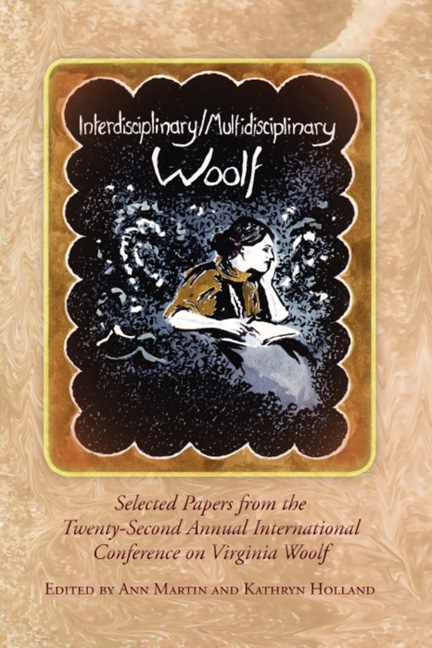Book contents
- Frontmatter
- Contents
- Introduction to Interdisciplinary/Multidisciplinary Woolf
- Acknowledgments
- List of Abbreviations
- History, Materiality, Multiplicity
- Patterns, Practices, Principles
- Art, Influence, Embodiment
- Publishing, Politics, Publics
- “The most unaccountable of machinery”: The Orlando Project produces a textbase of one's own
- The Hotel at the End of the Universe
- Globalization, Inter Connectivity, and Anti-Imperialism: Leonard Woolf, the Hogarth Press, and Kenya
- Chinese Eyes and Muddled Armenians: The Hogarth Press and British Racial Discourse
- “No One Wants Biography”: The Hogarth Press Classifies Orlando
- There Goes the Bride: Virginia Woolf, Julia Strachey, and the Hogarth Press
- Redefining Woolf for the 1990s: Producing and Promoting The “Definitive Collected Edition”
- The Believers: Writers Publishing for Readers, Or Preliminary Musings on The Hogarth Press and McSweeney's
- The Woolfs in Print and Online: A University Press in Transition
- Notes on Contributors
- Conference Program
The Hotel at the End of the Universe
from Publishing, Politics, Publics
- Frontmatter
- Contents
- Introduction to Interdisciplinary/Multidisciplinary Woolf
- Acknowledgments
- List of Abbreviations
- History, Materiality, Multiplicity
- Patterns, Practices, Principles
- Art, Influence, Embodiment
- Publishing, Politics, Publics
- “The most unaccountable of machinery”: The Orlando Project produces a textbase of one's own
- The Hotel at the End of the Universe
- Globalization, Inter Connectivity, and Anti-Imperialism: Leonard Woolf, the Hogarth Press, and Kenya
- Chinese Eyes and Muddled Armenians: The Hogarth Press and British Racial Discourse
- “No One Wants Biography”: The Hogarth Press Classifies Orlando
- There Goes the Bride: Virginia Woolf, Julia Strachey, and the Hogarth Press
- Redefining Woolf for the 1990s: Producing and Promoting The “Definitive Collected Edition”
- The Believers: Writers Publishing for Readers, Or Preliminary Musings on The Hogarth Press and McSweeney's
- The Woolfs in Print and Online: A University Press in Transition
- Notes on Contributors
- Conference Program
Summary
The late thirties was an extraordinarily painful but also an extraordinarily productive time for Leonard Woolf, as it was for Virginia. Many friends and family members had died in the thirties, the Spanish Civil War that would take the life of Julian Bell raged from 1936 until 1939, and capitalist, communist, and Fascist barbarians were about to destroy Europe. Virginia Woolf had just completed The Years (1937), and was writing Three Guineas (1938), the biography of Roger Fry (1940), and Between the Acts (1941). In 1939 alone Leonard published Barbarians at the Gate (in the U.S. Barbarians Within and Without), the second volume of After the Deluge, and his only play, The Hotel. I will focus here on Leonard's quest to see his play The Hotel produced. Many factors contributed to Leonard's difficulty in realizing his play in performance: the outbreak of war, the play's sharp satirical treatment of religion and of UK and European politicians, and Leonard's own inexperience with play-writing. But behind this “non-production” history, is the suggestion that Leonard, like Virginia, was ahead of his time, introducing absurdist theatrical techniques almost worthy of Genet and Albee in an age still dominated by realism and melodrama.
At the end of March 1938 Virginia Woolf wrote in her diary “L. writing his play— the one he's brewed these 10 years & more” (D5 133). In August she noted progress with “P.H.” (Pointz Hall that would become Between the Acts), adding “Its to end with a play. L. is writing his in the garage room. I note he doesnt like to be asked when will it be done? He has, amusingly, all an artists sensibilities” (D5 159). A diary entry dated 13 October noted “went to Tilton & read L's play to the K.s,” adding “They gravely approved. M. as intent as a terrier. Very interesting. We like it very much. Suggest the Group Theatre” (D5 180). In a letter to Vanessa, curiously dated Oct. 8 (five days earlier than the diary entry), she wrote: “had tea with the Keynes…L. read them his play; They seemed rather impressed; they think the Group may do it. I thought it rather good too…
- Type
- Chapter
- Information
- Interdisciplinary/Multidisciplinary Woolf , pp. 225 - 230Publisher: Liverpool University PressPrint publication year: 2013



